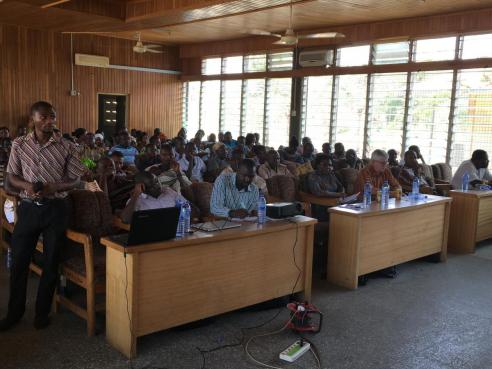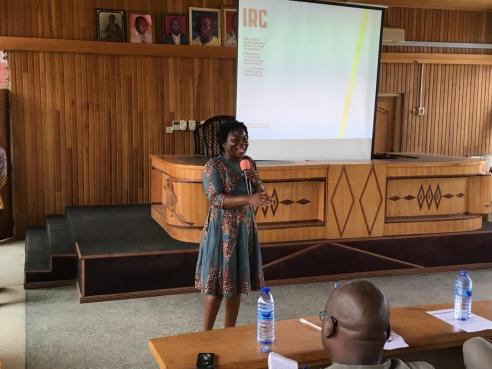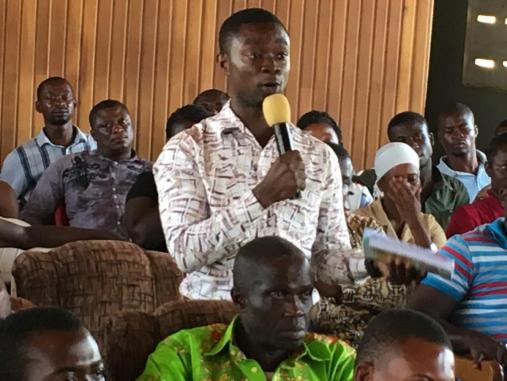The District Based Full Coverage start-up initiative was launched with Asutifi North District as the selected district.
Published on: 04/05/2017

Ghana is committed to the attainment of Sustainable Development Goal (SDG) 6 for ensuring sustainable management of water and sanitation services for all by 2030. Consistent with this goal, the WASH sector in Ghana aspires to reach full coverage by 2025. Within the rural and small town sub-sector in Ghana, progress has been made in extending rural and small town coverage from 29% in the 1990s to 65% in 2015 with very slow growth registered in sanitation coverage which stands at about 15% (in 2015). Challenges ranging from lack of finances to poor sector coordination within the local decentralised system hamper progress and the achievement of set targets by 2025.
IRC, Safe Water Network (SWN) and partners aim to contribute to Ghana’s 2025 target and SDG 6 by implementing a long-term District Based Full WASH Coverage initiative in the Asutifi North district of the Brong-Ahafo Region of Ghana over the next 15 years to ensure every citizen of the district has access to water and sanitation services. The partners also hope to use this initiative to demonstrate that it is possible to achieve full coverage in sustainable rural water and sanitation services within a district. Positive results will be shared across Africa and the world at large for possible replication.
The specific objectives of the initiative are to:
The key moments so far include the district selection process, district context and gap analysis and the launch of the District Based Full Coverage start-up initiative.
The initiative kick started in Ghana with a rigorous and diligent selection process. Five district assemblies were shortlisted after this. Then followed field assessments of the socio-economic preconditions of the shortlisted districts focusing on such issues as policy environment, institutional capacity, operational services and planning for WASH service delivery. Based on the outcome of the field visits, Asutifi North District ranked highest on the four issues assessed. The district has the most conducive policy environment for promoting WASH; it has the requisite capacity at the district assembly as well as from the private sector and NGOs. In terms of operational practices, it has by far the best management system with an unusually high acumen for monitoring and maintenance of facilities and stakeholder relationships.
Asutifi North also faces the typical challenge of rapid urbanisation and agglomeration due to economic pulls. It presents a growing local economy moving from subsistence agriculture to mining, commerce and services and small-scale process. The transition in all respects presents opportunities and these must be nurtured, enhanced and facilitated to support the effective change and delivery of WASH.
Following the selection of the district, a detailed context and gap analysis was initiated with the district authorities to take stock of the existing WASH situation in the district and identify the needs and requirements for a full coverage programme. The process focused on key areas of WASH delivery including district profile, policy environment, capacity for WASH delivery, operational and service delivery issues, key opportunities, success factors and challenges. In addition, a stakeholder analysis was carried out to map all key stakeholders in the district and outside, and opportunities to build partnerships to leverage support for the initiative, to ensure ownership.

Finally, at an inception workshop held on March 16, 2017, which drew stakeholders from government, the private sector, service providers, private operators, development partners, service users, and traditional authorities among others from the WASH sector in- and outside the district. IRC, Safe Water Network, Asutifi North District Assembly and partners, with the support of the Conrad N. Hilton Foundation, launched the District Based Full WASH Coverage start-up initiative in Kenyasi. This initiative will support the design of a Master Plan for achieving universal coverage, to create a blueprint for districts to reach full coverage. The workshop underscored the collective commitment of stakeholders towards the realisation of SDG 6 in the district through the full coverage initiative. Key stakeholders at the workshop welcomed the initiative and pledged to cooperate with all the partners and participate actively in the development of the Masterplan by contributing their time, ideas, and resources to ensure that all their WASH concerns and aspirations are reflected in the plan. The District Assembly is fully committed to incorporating the Masterplan into the District Medium Term Development Plan (2017-2020) currently under development to ensure that the initiative is properly aligned and harmonised within the overall development agenda of the district.

The Asutifi North district is one of the districts currently facing critical WASH issues and therefore serves as a good entry and rallying point for mobilising collective action to support the initiative. With the presence of a vibrant private sector such as Newmont Mines, committed traditional authorities, as well as capacitated and motivated district staff, the right enabling environment exists for implementing the full coverage initiative.